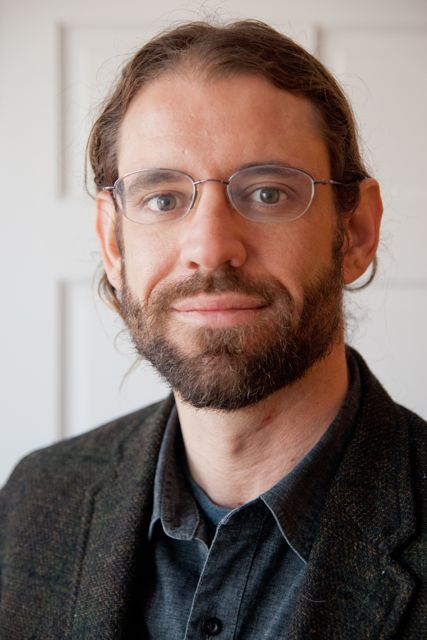Asheville psychiatrist Daniel Johnson didn’t set out to transform his profession. But he’s now part of a growing movement, both locally and nationally, that’s challenging the most fundamental assumptions about mental illness.

Dr. Johnson launched a private practice here in 2010 and, like most psychiatrists, he prescribed medications for his patients. But a controversial article he read nearly a year and a half ago got him thinking and eventually led to a profound shift in the nature of his work (see sidebar, “By the Book(s)”).
“Unfortunately, and sadly, more often than not, medications do more harm than good,” Johnson now maintains. “And of course I had contributed to all that in my own practice. I had a lot of soul searching and reckoning to do on a personal level.”
Nonetheless, Johnson — a graduate of the UNC School of Medicine who spent several years working in Mission Hospital’s inpatient psychiatric unit — says he did “a lot of apologizing” to clients, including those who later experienced a difficult withdrawal from a particular antidepressant he’d prescribed: “They put a lot of trust in me, and I feel like I led them astray.”
Many in the field would disagree with that position. And while Johnson says he’s gotten some support from colleagues, psychiatrists who help patients safely withdraw from psychiatric drugs are few and far between.
Asheville resident Faith Rhyne, a former patient of Johnson’s, says, “There’s something very reductionist about the conventional approach to mental health, which … really is that you have a chemical imbalance, and it’s a disease, and you have to take medication in order to fix that.”
With Johnson’s help, she’s been off psychiatric meds for more than a year. “I feel so much better,” she reports.
Rhyne belongs to the Asheville Radical Mental Health Collective, one of several local alternative support networks (see sidebar, “Helping Hands”). “You are more than your diagnosis,” she declares. “You are more than whatever quick answer might have been handed to you.”

Revisiting assumptions
What started Johnson on his revisionist journey was an essay by Dr. Marcia Angell, a former editor at The New England Journal of Medicine, that reviewed three books condemning the use of drugs to treat mental illness.
Although the essay sparked push-back from the medical establishment in the form of letters to the editor, for Johnson, those books’ conclusions “opened my mind to a line of thought which challenged a lot of my convictions but also made a lot of sense, and presented a very compelling argument for re-examining the work I do.”
Around the same time, Johnson decided he was tired of fighting with insurance companies, so he stopped accepting insurance altogether. That, he says, forced him to listen more closely to what his patients were actually saying rather than trying to align what they told him with the Diagnostic and Statistical Manual of Mental Disorders so he could get reimbursed for services rendered.
Johnson’s quest to learn more about the subtleties of medication withdrawal led him to the work of Dr. Peter Breggin, a Harvard-trained psychiatrist basaed in Ithaca, N.Y., who’s written extensively about the dangers of psychiatric drugs and electroconvulsive therapy. Breggin’s website (breggin.com) warns that psychiatric drugs are dangerous both to start and to stop, and the latter should be “done carefully under experienced clinical supervision” to avoid “life-threatening emotional and physical withdrawal problems.”
To safely taper patients off their medications, Johnson works with two compounding pharmacies in town, which create successively smaller doses of the drugs, rather than the standard dosages available from pharmaceutical companies. Depending on the number of meds involved, the process may take a couple of years. In addition, individual and group therapy help patients process what they’re feeling.
Once they’re weaned from the drugs, says Johnson, they can get a clear view of their inner self and are better able to do grounded bodywork with some of the many alternative and complementary medicine practitioners in town.
“When people start believing that there’s hope that they can live off of meds, that sense of self-empowerment … can be transformational,” he reports.
Full recovery
Bat Cave residents Lisbeth Riis Cooper and her husband, Don Cooper, on the other hand, take a somewhat more nuanced stance concerning psychiatric drugs.
In response to their own frustrations navigating the mental health system with their teenage daughter, the couple founded the CooperRiis Healing Community in 2000. The local nonprofit runs two holistic, residential treatment centers for people with mental illness or emotional distress — one on a Polk County farm and the other in Montford — that take what the website (cooperriis.org) calls a “medication optimization” approach which “supports the judicious use or non-use of psychotropic medications, based on evidence from methodologically sound and responsibly interpreted research studies.” Options include balancing med use with other services and supports, postponing their use, combining medication with other approaches to minimize their use, or avoiding them altogether.
The treatment centers, says CooperRiis Executive Director Virgil Stucker, focus on “empowering choice by the individual — informed choice that helps them know when medications may be useful and when not, especially over the long term.”
Further expanding the boundaries of their work, the Coopers pledged $2 million IN 2011 to the newly formed Foundation for Excellence in Mental Health Care, whose board chair is Stucker. The foundation aims to promote better mental health outcomes by highlighting existing research, developing and funding new research, and helping launch new programs.
One of those programs, the Asheville-based Mother Bear Community Action Network, provides support to families with relatives facing mental health challenges, says Jennifer Maurer, the project’s communications and program director.
Last fall, the fledgling nonprofit partnered with a Toronto-based group to produce an online mental health education course. Mother Bear plans to offer the course again this spring, says Maurer, and is also working on launching local family support groups (called “dens”) and a “warm line” offering non-emergency phone support for families as well as access to recovery resources.
It’s all done through the lens of the recovery movement, which is fueled by people who’ve gone through the mainstream psychiatric system and received a label, Maurer reports.
“You hold the potential that full recovery is possible,” she explains. “These challenges are not necessarily lifelong, degenerative, chronic diseases.”
Mad pride
The Asheville Radical Mental Health Collective, meanwhile, approaches mental health challenges from a completely different vantage point: the mad pride movement, which seeks to destigmatize mental illness and give those dealing with it a greater voice.
Formed in 2005, the Asheville group was inspired by The Icarus Project (theicarusproject.net), a New York City-based online forum and support network whose tag line is “navigating the space between brilliance and madness” and whose mission includes forging a new culture and language around mental health.
Members of the collective meet weekly in a corner of The Downtown Market on South French Broad Avenue, says Rhyne, who joined the group in 2009. They share their stories and offer one another support and information.
“I think there’s something really powerful when you have the wholeness of yourself and your story and your experiences recognized and affirmed,” she says.
Pulled into the psychiatric system at a young age, Rhyne says the experience “impacted my life hugely for years and years and years.” Diagnosed with a “severe, persistent disorder,” she ultimately didn’t find the conventional approach to treatment helpful.
“I felt very alienated from the common human community,” Rhyne recalls. The collective, she says, gives her “a space to just be myself.”
These days, Rhyne maintains her mental health through sensible sleep and nutrition habits, fostering connections with other people, learning to deal with stress, and having activities and an occupation — she’s a certified peer support specialist for others facing mental health challenges — that resonate with her and reflect her interests.
“Al” (who didn’t want his real name used) began attending the collective’s meetings after a “very, very hard time last year.”
“What I’ve gotten from it is an opportunity to share my experience in a safe place with people who understand what it can be like to feel isolated,” he reveals.
Instead of seeking a mental health diagnosis and medication, Al says he’s sustained by the collective’s support, sessions at All Souls Counseling Center and alternative approaches such as CranioSacral therapy and Somatic Experiencing.
And while he and Rhyne don’t entirely agree concerning the merits of psychiatric medicine, that’s perfectly acceptable, the collective maintains.
“Meeting people where they’re at and respecting individual choice is so core to what we’re trying to do, which is create that space of exploration where nobody’s going to tell you what’s right for you,” says Rhyne. “We all have the right to make personal choices about our health.”
Asheville writer/editor Tracy Rose can be reached at Tracy.B.Rose@gmail.com.




Why are the “resources” stuck in the middle of the article instead of at the end, as one would normally format such a thing? Am I the only one driven crazy by this?
Might I suggest the Chicago Manual of Style as a starting place?
Thanks, Ascend. I think the webmaster will be able to fix that shortly.
Technical difficulties! Those issues should now be resolved.
Great article! It is concerning that so many people are on psych meds which deeply alter body chemistry and can permanently alter brain function. There are many people that think that at least some of the violent rampages that have happened in recent years may have been due to people being on, or coming off of, psychiatric medications.
I wish this article spoke more about the proven track record of recovery-oriented treatment, and Open Dialogue, for even the most challenging mental health diagnoses. This is an interesting link: http://beyondmeds.com/2011/03/21/finnishopendialogue/
I am happy to see some psychotherapeutic (i.e. therapeutic group counseling) resources available instead of pharmaceuticals.
We have been arguing over the effectiveness of psychotherapy for over a century now.
In the late 19th/early 20th century, mental illness was finally recognized as a disease rather than a moral or character flaw and the first, somewhat successful, attempts to treat it were pioneered through psychotherapy by Freud and Jung.
Unfortunately, these practitioners were not cheap or abundant, so cost-eefective and safe treatment on sizable populations had to be conducted within institutions.
By the 1950s, cheaper and more available pharmaceuticals had largely replaced psychotherapy, most of our in-patient mental health infrastructure was closed down, and
psychotherapy became discredited as a salon treatment for the neurotic but functional upper class.
Now, pharmaceuticals are again under fire and the lack of in-patient instututions and out-patient care, both medical and psycotherapeutic, are (finally!) under scrutiny, but healthcare costs and civil rights concerns prevent either from being seriously reformed. We cannot talk about institutionalization because the Left will cry “fascist discrimination!”, and we cannot talk about better public funding or the Right will cry “socialist redistribution!” and neither will yield one inch toward the other.
In the brief time I worked in Substance Abuse therapy, I was informed that the most effective (albeit in single digit percentiles) form of SA treatment was psycotherapeutic group and individual counseling, mostly within the framework of 12-step. (I would love to hear from anyone currently in the field to confirm or invalidate this, I never saw the numbers in print). Those clients who did succeed were the ones who proactively participated in such counseling.
Reductionist thinking in psychiatry has to do with Freudian model, not chemical/medical model. Rather than consulting patients it might be better to consult professionals with regards to the problems within this system.
I don’t get the whole “reject this treatment” or that one. Absolutism rarely serves anyone well. While there is a tendency toward embracing the notion of better living through chemistry, i.e. a drug for every occasion or condition, some people with serious conditions rely on meds to function normally.
I’m all for de-stigmatizing mental health conditions as none of the sufferers asked for those conditions. There is nothing self-inflicted about bipolarism or depression, but they are very much real, for the person and those around him/her. But, there is no single course of action that is going to have best results for every patient.
Mr WarEagle82 (cool name, native American?)
I would note that the choice of words like “reject mainstream” and “challenge fundamentals” were not found in quotes from the caregivers, leading me to believe that they were the choice of the journalist, not of the caregivers.
Making innovation seem radical by rejecting convention is a clever marketing ploy, especially to attract those who feel victimized by convention. And before anybody gets on their high horse, I am not suggesting that the caregivers are using this strategy to market their services, but that MX is using it to market their story.
While the caregivers’ approaches to treatment are clearly unconventional and alternative, they are portrayed, via the caregivers own quotes, in more positive terms that emphasize choice, self-awareness and self-esteem.
But bad news sells better than good, so MX spins the subject as anti-what-is more than pro-what-could-be. Nothing wrong with that, it is what it is.
Thank you for the comments, Big Al, but marketing was the furthest thing from the minds of the reporter and editor: They’re making a fair attempt to summarize the key elements of the story, respect the ideas put forth by those interviewed and choose le mot juste.
On another note, WarEagle82 could be an Auburn (Alabama) University graduate, class of ’82. Just a guess, as I’m a Univ. of Alabama grad.
Thank you all for commenting.
To wareagle: conventional psychiatry gets so much unquestioning coverage. I am so pleased that Mtn X framed this piece as an inquiry into another perspective. It is a perspective that has not received much attention, what with all the recent scare-mongering that the mentally ill will kill us all.
*Informed consent* is the concept that people are working with here. Too often psychotropic medications that are profoundly altering are prescribed after a 15 minute visit; we all know these conditions are overdiagnosed, the DSM criteria are arbitrary, the patient’s right to be fully informed, educated and autonomous is so often rejected (especially for low-income patients). No one in the article would suggest that no one should have access to psych meds if they so choose. But the current model of railroading people into these heavily medicated situations which are very hard to emerge from should be questioned.
There are people who dispute the concept of bipolar disorder as a brain-based condition. In Chinese medicine, these symptoms are not seen to originate in the brain, but from a constitution with a “hot liver”, and treated accordingly. Not a perspective that the psychiatric lobby would like to gain prominence, as the idea that these conditions are lifelong, worsening, and need to be maintained with multiple medications insures dependence and a steady supply of customers.
I’m more likely to entrust my health to a thousands-of-years old system with impeccable ethics and a holistic vision than a 50 year old industry that consists of hit-or-miss chemical warfare on the body.
It is very difficult to break out of the mentality that the last 50 years of psychiatry has created, but once one does, the possibility emerges that the treatment very likely inflicts as much, or more, harm than the original crisis.
The idea that “I know better than you what you need” becomes addictive to psychiatrists. Many of them refuse to have their authority questioned by collegues on treatment teams, much less by patients.
Not to say that there aren’t some good eggs in the field, but the idea of unquestioning dependence on an authority as the moral arbiter of human behavior is built into the profession.
That method of treatment will soon be recognized as the dinosaur that it is.
It’s been a long time since this was written, so I doubt anyone checks this, but I was wondering if anyone is doing the kind of work that Dr. Johnson use to do in Asheville anymore? I’m looking for someone to help me taper off meds.